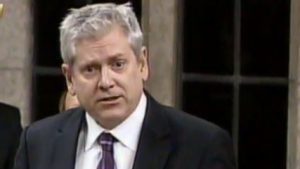(Federal Health Minister Jane Philpott during question period Thursday. APTN/image)
Jorge Barrera
APTN National News
Health Minister Jane Philpott said Thursday she would be investigating the case of a 14-year-old Cree girl who was denied coverage for urgent dental work despite recommendations from orthodontists the procedure was needed to avoid costlier invasive surgery.
Health Canada issued a final denial of coverage on Monday, a day before the Canadian Human Rights Tribunal issued a scathing ruling concluding the federal government discriminated against First Nation children by underfunding child welfare programs.
The ruling also ordered Ottawa to stop its narrow application of Jordan’s Principle which requires federal bureaucrats to cover the urgent medical needs of First Nations children before settling jurisdictional funding issues with the provinces.
The mother of the girl said she was given renewed hope by Philpott’s pledge, which was made in the House of Commons during question period.
“I am starting to feel like there is some light,” said Stacey Shiner, 42, whose daughter is a Sucker Creek band member and is covered by Treaty 8 in Alberta.
NDP MP Charlie Angus raised the plight of Shiner’s daughter during question period.

“I ask myself, as a parent, how is that possible? To the health minister, what steps is she taking to issue directives…to make it right for (the girl) and all the other children who are still being denied basic rights every single day?” said Angus.
Philpott said the Liberal government is committed to ending the systemic discrimination of First Nations children.
“I will look into the situation that the honourable member has brought to my attention,” said Philpott.
Shiner said she has been battling with Health Canada for almost three years over the department’s refusal to cover her daughter’s desperately needed dental work under the Non-Insured Health Benefits for First Nations and Inuit program.
Despite letters from orthodontists and lobbying from the band and Treaty 8, Health Canada rejected the coverage request and subsequent appeals. The last rejection came on Monday, a day before the human rights tribunal issued its ruling after finding Canada systemically discriminated against First Nation children.
Shiner has since contacted a Toronto lawyer, on the advice of Cindy Blackstock, a prominent child advocate who triggered the human rights ruling through her complaint against Ottawa first filed in 2007. She said the lawyer has taken on the case for free and is preparing to push the matter before the court, if need be.
“The next step is to take the Canadian government to Federal Court, which we are preparing to do,” she said.
Shiner’s daughter, who she did not want named, has problems with her jaw, which is out of place, and seriously misaligned teeth that causes her pain and headaches.
Shiner said the orthodontists told her in 2013 her daughter needed immediate intervention, including an expander, an anchor and braces to avoid invasive surgery when she got older.

Shiner said the surgery would have involved cutting bone from her hip and applying it to the jaw which would be wired shut.
Yet, Health Canada repeatedly refused to pay for the dental work, concluding that the procedure did not meet its criteria as a “functioning handicap malocclusion.” Malocclusion is a term describing misaligned teeth.
Health Canada also told Shiner that if she paid out of her own pocket for the dental work the insurance program would also not reimburse her.
“And I said, ‘I have to leave her in her condition and can’t help her?’ And they said, ‘Yeah, pretty much, if you go ahead and start we won’t approve.’”
Shiner said she couldn’t handle letting her daughter remain in pain so she paid over $8,000 for the dental work.
Shiner said she was told Alberta would have covered at least part of the cost for the dental work if her child was non-First Nation.
And this wasn’t the first time Shiner said she’s faced the callousness of Health Canada bureaucrats.
In 2008, after surgeons removed a tumour from behind her daughter’s eye she was given a prescription for a specialized eye-drop. Shiner said the eye-drop was designed to protect the eye from the roots of the tumour which were left because they were embedded in such a way their removal would have collapsed the eye.
Yet, Health Canada would not pay for the prescription. She still remembers the conversation with the pharmacist after he got off the phone with the Health Canada bureaucrat.
“He said, ‘They denied it, as a matter of fact they told me to tell you to guy buy Visine, that it should be sufficient,’” said Shiner.
She paid the $90 for the specialized eye-drop.
“The more that she gets older and things are happening the more I am realizing they are prejudiced and they just don’t care in helping children, specially Aboriginal children,” she said. “We are quite connected with the Aboriginal communities here and I see it time and time again.”
@JorgeBarrera









